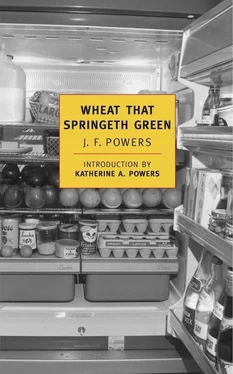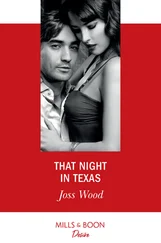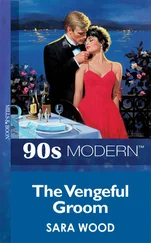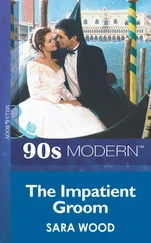J. Powers - Wheat That Springeth Green
Здесь есть возможность читать онлайн «J. Powers - Wheat That Springeth Green» весь текст электронной книги совершенно бесплатно (целиком полную версию без сокращений). В некоторых случаях можно слушать аудио, скачать через торрент в формате fb2 и присутствует краткое содержание. Год выпуска: 2000, Издательство: NYRB Classics, Жанр: Современная проза, на английском языке. Описание произведения, (предисловие) а так же отзывы посетителей доступны на портале библиотеки ЛибКат.
- Название:Wheat That Springeth Green
- Автор:
- Издательство:NYRB Classics
- Жанр:
- Год:2000
- ISBN:нет данных
- Рейтинг книги:5 / 5. Голосов: 1
-
Избранное:Добавить в избранное
- Отзывы:
-
Ваша оценка:
- 100
- 1
- 2
- 3
- 4
- 5
Wheat That Springeth Green: краткое содержание, описание и аннотация
Предлагаем к чтению аннотацию, описание, краткое содержание или предисловие (зависит от того, что написал сам автор книги «Wheat That Springeth Green»). Если вы не нашли необходимую информацию о книге — напишите в комментариях, мы постараемся отыскать её.
Wheat That Springeth Green — читать онлайн бесплатно полную книгу (весь текст) целиком
Ниже представлен текст книги, разбитый по страницам. Система сохранения места последней прочитанной страницы, позволяет с удобством читать онлайн бесплатно книгу «Wheat That Springeth Green», без необходимости каждый раз заново искать на чём Вы остановились. Поставьте закладку, и сможете в любой момент перейти на страницу, на которой закончили чтение.
Интервал:
Закладка:
Joe, speaking through his nose, named the wine.
“On second thought, no,” said Father Felix, perhaps wisely, and moved off with his plate, holding it carefully with both hands but in a sloping manner.
Hennessy was next, and he also refused wine. But he complimented Joe on his building program, calling the rectory “a crackerjack,” which suggested to Joe that the works of Father Finn were still being read and might have figured in Hennessy’s vocation, as they had in his own. “You should see the office area,” Joe said to Hennessy. “Maybe, if there’s time later, I could show you around the plant.”
“Oh, no !” said Conklin, next in line, and turned to Potter in disgust, but Potter was talking to Bill, and Hennessy (“Maybe later, Father”) was moving off, and so Conklin, after more or less insulting Joe, had to face him alone.
“Wine, Mr Conklin?”
“ Si, señor .”
Maybe it went with the mustache, but Joe wondered whether a priest should be so addressed, whether “reverendissimo” or something wouldn’t be more appropriate, whether, in fact, Conklin had meant to pay him back for the “mister.” At the seminary, as Conklin would know, there were still a few reverend fathers who made much of “mister,” hissing it, using it to draw the line between miserable you and glorious them — which hadn’t been Joe’s intention. After all, what was Conklin now, and what was he ever likely to be, but “mister”? It didn’t pay for someone in Conklin’s position to be too sensitive, Joe thought.
And listened to Potter, who was saying (to Bill) that he’d had a raw egg on his steak tartare in München and enjoyed it. “ Mit Ei , they call it there.”
“You can enjoy it here ,” Joe said. “Mrs Pelissier!” he cried, not pronouncing her name as he usually did, but giving it everything it had, which was plenty, in French.
Joe and everybody (except Father Felix) urged Potter to have a raw egg on his steak tartare, as in München— Mit Ei! Mit Ei! But Potter wouldn’t do it, although Mrs P. produced a dozen nice fresh ones, entering the study in triumph, leaving it in sorrow. Joe almost had one himself, for her sake. Potter came out of it badly.
Joe was hoping the BarcaLounger would clear when he set forth with glass and plate, but Conklin was in it, and it didn’t, and so he went and sat near Hennessy and Father Felix. “Never cared for buffet,” he told them, and got no response. (Hennessy was saying that the monastic life was beyond one of his modest spiritual means, Father Felix that one never knew until one tried.) Joe tried the other conversation. (Potter was building up the laity, at the expense of the clergy, as was the practice of the clergy these days.) “Some of your best friends must be laymen,” Joe said, and was alarmed to see Potter taking him seriously: that was the trouble with the men of Bill’s generation — not too bright and in love with themselves, they made you want to hit them. “But what about the ones who empty their ashtrays in your parking lot?”
Potter smiled— now he thought Joe was kidding.
“Not much you can do,” Conklin said. “Judah took possession of the hill country, but he couldn’t drive out the inhabitants of the plain, because they had chariots of iron.”
“That so?” said Joe, thinking, What is this? He tried his wine. “Not bad,” he said to Potter and Bill (who still had their drinks from Bill’s room), but he didn’t get through to them. Potter was a talker.
“What kind is it?” said Father Felix.
Joe, speaking through his nose, named the wine.
“Grape,” said Conklin, coming back from the table with the bottle from which only he and Joe had partaken so far, and sitting down with it, in the BarcaLounger. “Anybody else?”
“No, thanks,” Joe said, and was silent for some time — until he heard Conklin refer to Beans McQueen as Beans. “You a friend of Father McQueen’s?”
“They taught this course together, at the Institute,” Bill said. “Scripture for the Laity.”
“That so?” said Joe.
And the talk went on as before, on two fronts, without Joe, leaving him free to go over to the table for the other bottle of wine. Hennessy wasn’t having any, but Father Felix was. “Grape, you say?” Joe served Father Felix, and also himself, and left the bottle on the coffee table in front of him, but beyond his reach — not that wine, unfortified wine, was really alcoholic, not that he was. He just had to watch himself. He wasn’t a wine drinker, but could see how he might have been one in another time and place — one of those wise old abbés, his mouth a-pucker with Grand Cru , his tongue tasting like steak, solving life’s problems by calling people “my daughter” and “my son.”
Potter was telling Bill and Conklin that the clergy should cast off their medieval trappings, immerse themselves in the profane everyday world, and thus reveal its sacred character.
“That why you’re immersed in that shirt?” said Joe.
Potter just smiled and went on as before. It was odd the way Bill looked up to Potter, odder still the way they both looked up to Conklin — as what , a layman? It was a crazy world. Father Felix was telling Hennessy that the monastery should employ trained lay personnel in key positions, replace the kitchen, if not the laundry, nuns, and also certain brothers. “So Brother Gardener has to go?” said Joe.
Father Felix turned to Joe. “ You ,” he said, speaking with deliberation, as if the wine, and whatever he’d had in Bill’s room, and the beer before that, had suddenly gone to his head. “ You. Covered. Up. Those. Flowers. ”
“Flowers?” said Joe, and listened to the silence in the study. For the first time since the party began, he felt that others were interested in what he might say. He started to tell them about the leftover sod, but saw that they already knew about it, that he was already — the pastor’s fate — being discussed before outsiders in his own rectory by the curate and the visiting priest, those natural allies. “Thought of putting the sod down around the flowers, if you could call ’em that — things like petunias. Have ’em growing right up out of the grass. Of course, you’d have to cut the grass by hand. I’ve always wondered about flower beds — who wants to look at a lot of dirt?” (Nobody else, it seemed, had ever wondered about this.) “Didn’t realize you felt so strongly about petunias, Father. Strawberries, yes.”
“Humph,” said Father Felix.
“Excuse me,” Joe said, believing that everybody was against him, and went over to the table, where he had work to do. He had to fire up the chafing dish, pour the juice from the pitted Bing cherries into the top pan, or blazer, place it directly over the flame, bring the juice to a boil, thicken with ½ tsp. of arrowroot dissolved in a little cold water, but Potter was telling the others that family life was in such tough shape today because Our Lord had been a bachelor, and so, carrying a dead match to an ashtray, Joe appeared among them again, saying, “We used to ask a lot of silly questions in the sem. Would Our Lord be a smoker, drive a late-model car, and so on. Kid stuff — nobody got hurt. But I wonder about some of the stuff I hear today.”
“So do I,” said Hennessy. “That Our Lord was celibate is a pretty good argument for celibacy.”
“No more. People today, living normal lives, can’t identify with Our Lord,” Potter said. “Or with us —because of the celibacy barrier.”
“That so?” said Joe. “And where you don’t have that barrier? I mean how well do we identify with Our Lord?” Joe put the question to Bill with a glance, skipped Conklin, and tried but failed with Father Felix, who was spearing kernels of corn with his fork, making a clicking noise on his plate — rather annoying, since it broke what otherwise would have been an impressive silence.
Читать дальшеИнтервал:
Закладка:
Похожие книги на «Wheat That Springeth Green»
Представляем Вашему вниманию похожие книги на «Wheat That Springeth Green» списком для выбора. Мы отобрали схожую по названию и смыслу литературу в надежде предоставить читателям больше вариантов отыскать новые, интересные, ещё непрочитанные произведения.
Обсуждение, отзывы о книге «Wheat That Springeth Green» и просто собственные мнения читателей. Оставьте ваши комментарии, напишите, что Вы думаете о произведении, его смысле или главных героях. Укажите что конкретно понравилось, а что нет, и почему Вы так считаете.












